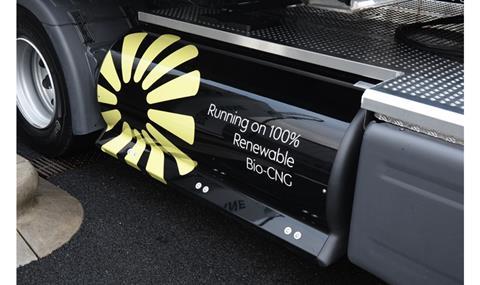
An increasing number of smaller operators are turning to dedicated gas powered trucks, according to Philip Fjeld the chief executive of CNG Fuels.
The company, which owns and operates three biomethane gas refuelling stations at Leyland, Crewe and Northampton, is planning to open another 18 in the UK by the end of next year.
Speaking to MT, Fjeld said that whilst his typical customers are large corporate firms that operate fleets of between 300 to 600 trucks, he has seen a rising number of smaller operations looking to add gas powered trucks to their fleets.
“We have seen a number of smaller companies ordering this year. These are not your MT Top 100 companies with huge fleets, these are operators running fleets of between 20 and 50 trucks,” he said.
Fjeld predicts that by the end of the year smaller operators running gas powered trucks will be in the double digit range.
“We have seen this trend grow over the last six to nine months.That may not seem much but it is significant if you think that not long ago it was zero.”
One factor driving demand from small and medium sized operators is the rising number of leasing schemes for gas trucks, Fjeld said.
Read more
- McPherson takes delivery of UK’s first liquefied natural gas Volvo FMs
- Waitrose and CNG Fuels underway with major dedicated gas truck trial
- Ocado opens Gasrec-built grid-connected CNG refuelling hub
“A year ago it was very hard to get compliance schemes for gas trucks. Now there are a lot of large leasing operators out there offering very attractive schemes for these trucks and that is making a difference," said Fjeld.
He added that other factors driving this growth are the recent launch of 400hp-plus gas powered trucks by Scania, Volvo and IVECO, growing confidence in the technology and increasing evidence that gas powered trucks can cut fuel costs and emission levels.
“If you are an MD of a smaller haulage business in an area where we have built a station you have a clear competitive advantage over other hauliers by running a green and renewable fleet and cutting fuel costs.”
With biomethane around 35%-40% cheaper than diesel and emitting 70% less CO2, on a well-to-wheel basis, Fjeld said operators of high-mileage HGVs stand to make the biggest financial savings and carbon reductions.
“If you replace a high mileage diesel artic with an equivalent gas powered truck on renewable biomethane you will reduce greenhouse gas emissions by 120 to 180 tonnes per vehicle per year. That is the equivalent of taking 60 to 80 passenger vehicles off the road. The numbers are staggering,” he said.
Fjeld believes these statistics are already making a mark on fleet operators’ purchasing decisions.
“We estimate there are around 300 dedicated gas trucks on the roads in the UK this year. Next year we estimate that will rise to well over 1,000.
"We have customers who are ordering 200 trucks to add to their fleet and customers who tell us they have bought their last ever diesel truck,” he said.
He added: “It is no longer a question of whether fleets will adopt gas powered trucks, it is now a question of the speed at which they will adopt the technology and I believe if you could fast forward by two years you would be very be surprised at how quickly that shift has materialised.”













